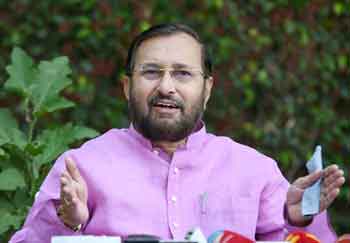Elaborating further, the Minister invited suggestions from youngsters regarding the future role of Publications Division in the changed scenario where in the Publications industry had undergone a drastic change both in content and technology. In view of the changed media scenario, Shri Javadekar stated that Publications Division needed to adapt itself through technological tools, e-commerce, business models, online publications etc. Crowd sourcing had become a principal tool to involve people in bringing about change and innovation and enhancing outreach through people’s involvement. The growing literacy in the country was a catalyst to promote relevant  contemporary writings. Adding further, Shri Javadekar said that the role of Publications Division was much more beyond mere publishing. As a Government institution the future road map lay in identifying benchmarks so as to ensure people had access to good quality publications. Literature remained the principal catalyst to promote creativity across different sections of society. This was a time tested exercise and it provided the people a sense of satisfaction across all age groups. The Minister also called upon Publications Division to explore the possibility of starting a special series/collection of prominent books/works on eminent personalities.
contemporary writings. Adding further, Shri Javadekar said that the role of Publications Division was much more beyond mere publishing. As a Government institution the future road map lay in identifying benchmarks so as to ensure people had access to good quality publications. Literature remained the principal catalyst to promote creativity across different sections of society. This was a time tested exercise and it provided the people a sense of satisfaction across all age groups. The Minister also called upon Publications Division to explore the possibility of starting a special series/collection of prominent books/works on eminent personalities.
One of the key initiatives of the Ministry of Information and Broadcasting to promote books and manuscripts original writing in Hindi, the Bharatendu Harishchandra awards have been implemented by the Publications Division annually since 1983.
Named befittingly after Bharatendu Harishchandra, who paved the renaissance for Hindi language and literature, the awards were initially given in Journalism and Mass Communication. The other three categories, viz., National Integration, Women’s Issues and Children’s Literature were added in 1992. Original writing in Hindi by Indian authors is the eligibility criteria for the award.
For the year 2011, the first prize in the Journalism and Mass Communication category was  awarded to Shri Vijay Dutt Shridhar for his manuscript ‘Pehla Sampadakiya’. Shri Harish Chandra Barnwal’s book ‘Television ki Bhasha’ has been chosen for the second prize in this category. The third prize went to Shri Santosh Kumar Nirmal for his book ‘Filmein aur Prachar: Tab se ab tak’.
awarded to Shri Vijay Dutt Shridhar for his manuscript ‘Pehla Sampadakiya’. Shri Harish Chandra Barnwal’s book ‘Television ki Bhasha’ has been chosen for the second prize in this category. The third prize went to Shri Santosh Kumar Nirmal for his book ‘Filmein aur Prachar: Tab se ab tak’.
In the Women’s Issues category, the award was conferred on Ms. Gitashri for her manuscript ‘Aurat ki Boli’ while for National Integration went to Dr. Navratan Kapoor for the book “Tyoharon Tatha Melon ki Vichitratain, Jansanchar Maadhyam aur Rashtriya Ekta”.
The first prize in Children’s Literature category for the same year was given to Ms. Bano Sartaj for her book ‘Pakya aur Parichham’ and the second prize to Shri Rajiv Saxena for ‘Professor Khurana ka Clone’.
For 2012, the first prize in Journalism and Mass Communication category was awarded to Ms. Vijaya Lakshmi Sinha’s ‘Maine Awaaz ko Dekha’, while the second and third prize was conferred on Shri Madhav Hada for his book titled ‘Seedhiyaan Chadhta Media’ and Shri Suresh Kumar’s ‘Online Media’ won the third prize.
In Women’s Issues category in 2012, Ms. Urmila Kumari’s book ‘Jaar Jaar Taar Taar’ was selected for the first prize while Dr. Sanjula Thanvi’s book ‘Manavaadhikar, Panchayati Raj Se Sashakt Naari’ was selected for the second prize.
In Children’s Literature category Dr. Mohammed Arshad Khan’s book ‘Mickey Mouse’ won the first Prize and the book ‘Phoolon se Pyar’ by Ms. Pavitra Agrawal received the second prize.

















